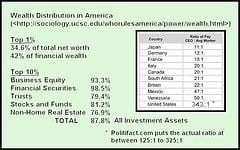
The decline of work carries social costs as well as an economic price tag
IMAGINE, as 19th-century utopians often did, a society rich enough that fewer and fewer people need to work — a society where leisure becomes universally accessible, where part-time jobs replace the regimented workweek, and where living standards keep rising even though more people have left the work force altogether.
If such a utopia were possible, one might expect that it would be achieved first among the upper classes, and then gradually spread down the social ladder. First the wealthy would work shorter hours, then the middle class, and finally even high school dropouts would be able to sleep late and take four-day weekends and choose their own adventures — “to hunt in the morning,” as Karl Marx once prophesied, “fish in the afternoon, rear cattle in the evening, criticize after dinner …”
Yet the decline of work isn’t actually some wild Marxist scenario. It’s a basic reality of 21st-century American life, one that predates the financial crash and promises to continue apace even as normal economic growth returns. This decline isn’t unemployment in the usual sense, where people look for work and can’t find it. It’s a kind of post-employment, in which people drop out of the work force and find ways to live, more or less permanently, without a steady job. So instead of spreading from the top down, leisure time — wanted or unwanted — is expanding from the bottom up. Long hours are increasingly the province of the rich.
Of course, nobody is hailing this trend as the sign of civilizational progress. Instead, the decline in blue-collar work is often portrayed in near-apocalyptic terms — on the left as the economy’s failure to supply good-paying jobs, and on the right as a depressing sign that government dependency is killing the American work ethic.
But it’s worth linking today’s trends to the older dream of a post-work utopia, because there are ways in which the decline in work-force participation is actually being made possible by material progress.
That progress can be hard to appreciate at the moment, but America’s immense wealth is still our era’s most important economic fact. “When a nation is as rich as ours,” Scott Winship points out in an essay for Breakthrough Journal, “it can realize larger absolute gains than it did in the past … even if it has lower growth rates.” Our economy may look stagnant compared to the acceleration after World War II, but even disappointing growth rates are likely to leave the America of 2050 much richer than today.
Those riches mean that we can probably find ways to subsidize — through public means and private — a continuing decline in blue-collar work.
The Latest Bing News on:
A World Without Work
- America’s child care crisis is holding back moms without college degrees: ‘They’re not giving us a chance’on April 27, 2024 at 8:30 am
For mothers without college degrees, a day without work is often a day without pay. An employment crisis among moms without a college degree is leaving many facing wrenching choices.
- Women At Work: A Deloitte Study Highlights Women’s Workplace Struggleson April 26, 2024 at 7:59 pm
A Deloitte report surveyed 5,000 women and highlighted many issues women face in the workplace. Here's how CEOs can help women at work and the entire organization.
- Study says it’s likely a warmer world made deadly Dubai downpours heavieron April 25, 2024 at 12:22 pm
A new report says circumstantial evidence points to climate change as worsening the deadly deluge that flooded Dubai and surroundings.
- When Meaningful Work Backfireson April 25, 2024 at 4:00 am
When you love your work, or if you’re very purpose-driven, your job will demand a lot of you. This causes burnout, too.
- Jason Kirk on ‘Hell Is A World Without You’ novel: ‘The response has been awesome.’on February 16, 2024 at 4:39 pm
his past college football writing and editing work for SB Nation, and his Vacation Bible School podcast on religion with his wife Emily Kirk. As for Hell Is A World Without You, that fictional ...
- How to have a Smart Home that can Work Without Interneton December 18, 2023 at 6:20 am
join us as we delve into the exciting world of offline smart homes. Can you have a Smart Home Work Without Internet? Let’s start with the big question – can you even have a smart home that ...
- A world without police is more possible (and necessary) than you thinkon October 31, 2021 at 5:00 pm
There are organizations across the country doing this work block by block ... I argue that is optimistic in the book is that the world without police already exists, right? It exists in our ...
- What would the world look like without the wheel and other everyday objects?on January 5, 2021 at 9:30 am
It has enabled computers to work on advanced scientific breakthroughs ... And in connection to that, his theory suggests a world without screws would be one with much higher levels of waste.
- A World Without Wateron December 5, 2018 at 8:17 am
As severe crises make the headlines, cities around the world are dealing with the new reality of water ... “It’s hard to access and expensive to work on. You have to do a retrofit, which makes it even ...
- A world without phosphateon October 11, 2016 at 3:17 pm
But today many soils are phosphate deficient, and farmers around the world need to purchase phosphates ... on a worldwide solution — one that will work for modern, western farming systems ...
The Latest Google Headlines on:
A World Without Work
[google_news title=”” keyword=”A World Without Work” num_posts=”10″ blurb_length=”0″ show_thumb=”left”] [/vc_column_text]The Latest Bing News on:
The decline of work
- Don’t fall for the ‘falling lady’ scam on escalatorson April 27, 2024 at 7:56 am
One travel scam involves a person – sometimes a person dressed an elderly woman – pretending to fall down an escalator.
- The Death Of The Follower - The Next Era Of Content Creationon April 27, 2024 at 7:24 am
The death of the follower has profound implications for the future of creativity online. How can content creators navigate the changing tides of social media?
- Millions of American Kids Are Caregivers Now: ‘The Hardest Part Is That I’m Only 17’on April 27, 2024 at 2:30 am
An estimated 5.4 million children help care for relatives, as families can’t afford or find other in-home care.
- Many hands, light work: A testament of community gardens creating togethernesson April 26, 2024 at 3:55 am
The Public Land for Food Campaign is about affecting change in the local food economy beginning from the foundational level.
- This Is What Your Poop Schedule Says About Your Risk of Cognitive Declineon April 25, 2024 at 10:04 pm
Constipation may be connected to worsening cognitive function, new research finds. The studies were of over 100,000 people.
- They Get Hit by Cars for Your Amusement. Will ‘The Fall Guy’ Get Them a Little Love?on April 25, 2024 at 6:49 pm
David Leitch’s latest action movie stars Ryan Gosling as the stuntman hero, but the director is also fighting to get Hollywood’s anonymous daredevils some long overdue real-life respect.
- Lights, camera… action? The decline of Florida's film industry and the effect on job marketon April 23, 2024 at 6:30 pm
Currently, Florida has several film schools throughout the state, however, students and graduates struggle to find jobs in the market. With less productions taking place in Florida, those seeking job ...
- Ryan Gosling Revealed Emily Blunt's Perfect Nickname on the Set of The Fall Guyon April 23, 2024 at 11:08 am
Gosling revealed the sobriquet during an interview with Today, where he and his co-star also shared whether or not their kids would be seeing the film. Both Gosling and Blunt have ...
- RISE AND FALL OF THE CITY OF MAHAGONNY is Now Playing at The Greek National Operaon April 22, 2024 at 2:13 pm
The Greek National Opera is now presenting Kurt Weill and Bertolt Brecht’s iconic opera Rise and Fall of the City of Mahagonny, from 12 April 2024 and for a run of six performances, at the Stavros ...
- The fall of the Queen of Airbnbon April 22, 2024 at 4:53 am
She promised investors an easy windfall. Then it all came crashing down.
The Latest Google Headlines on:
The decline of work
[google_news title=”” keyword=”the decline of work” num_posts=”10″ blurb_length=”0″ show_thumb=”left”]









